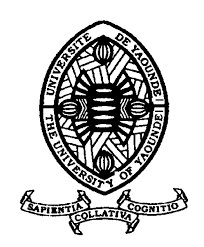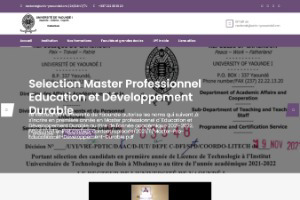University of Yaounde I

The University of Yaoundé I is a prestigious public university located in Yaoundé, the capital city of Cameroon. Founded in 1962, the university is recognized as one of the leading academic institutions in the country, providing a high-quality education to students from all over Cameroon and beyond. The university offers undergraduate and graduate programs in a wide range of disciplines, including arts and humanities, social sciences, natural sciences, engineering, and health sciences. With a commitment to academic excellence and research, the university provides students with a rigorous academic curriculum, practical experience, and opportunities to engage in cutting-edge research.
The history of the University of Yaoundé I can be traced back to the establishment of the Higher Teacher's Training College of Yaoundé (HTTC) in 1961. The HTTTC was created by the French colonial government to train teachers for the newly independent country of Cameroon. In 1962, the HTTTC was merged with the newly created Faculty of Law and Political Science to form the Federal University of Yaoundé. The Federal University of Yaoundé was the first university in Cameroon and it quickly became the country's leading institution of higher education. In 1972, the university was renamed the University of Yaoundé, reflecting the country's new unitary status.
The University of Yaoundé continued to grow and develop throughout the 1970s and 1980s. By the early 1990s, the university had over 20,000 students enrolled in a wide range of undergraduate and graduate programs. However, the university was also facing a number of challenges, including overcrowding, underfunding, and a lack of qualified faculty.
In response to these challenges, the Cameroonian government implemented a university reform in 1993. The reform split the University of Yaoundé into two separate entities: the University of Yaoundé I and the University of Yaoundé II. The University of Yaoundé I has played a leading role in the development of higher education in Cameroon. The university has produced many of the country's leading scientists, engineers, and business leaders. The university has also been a major force for social and political change in Cameroon.
University of Yaounde I is ranked as the #4 top university in Cameroon during 2025.
University Profile
Get a quick snapshot of the university's key details.
| 2025 Ranking | #4 |
|---|---|
| University Name | University of Yaounde I |
| Name in Local Language | Université de Yaoundé I |
| Acronym | UYI |
| Year Established | 1993 |
| Motto | Sapientia - collativa - cognitio |
| Motto in English | Wisdom - Collaboration - Knowledge |
| Governing Type | Public |
| Student Body | Co-education |
| Highest Degree | Doctorate |
| Campus Type | Urban |
Location
The university is located in Yaoundé, Central Province. Find the address and map of the university below.
| Address | BP 337, Yaoundé, Central Province, Cameroon |
|---|---|
Contact
Connect with the university easily! Find their contact details.
| Phone | +237 22 22 13 20 |
|---|---|
| Website |

|
| Click here to send email | |
| More Links |
Admission Info
To be admitted to the University of Yaoundé I, prospective students must meet certain requirements. Applicants must have a high school diploma or equivalent and must pass the national entrance exam. International students must provide proof of proficiency in French, as it is the language of instruction at the university. In addition to these requirements, applicants must also submit any additional documents or materials required by their chosen program or department, such as academic transcripts or letters of recommendation. The university also considers the results of any other relevant exams or qualifications when making admission decisions.
| Accepts International Students | Yes |
|---|
Scholarship and Financial Aids
The University of Yaoundé I offers various scholarships and financial aid programs to support students in their academic pursuits. These include merit-based scholarships, which are awarded to outstanding students based on their academic achievements and performance, as well as need-based scholarships, which are awarded to students with financial need. The university also offers scholarships for students from certain regions or demographic groups, as well as scholarships for students who demonstrate academic excellence in specific areas, such as research or community service. These scholarships cover tuition fees, accommodation costs, and living expenses, depending on the scholarship type and the needs of the student. To be considered for a scholarship, students must submit an application and meet the eligibility criteria specified by the university.
Programs and Courses
Get a quick overview of programs and courses offered at this university.
| Bachelor's Degrees | Master's Degrees | Doctorate Degrees | Diplomas | |
|---|---|---|---|---|
| Arts & Humanities | n/a | |||
| Business & Social Sciences | n/a | n/a | ||
| Engineering | n/a | n/a | ||
| Language & Cultural Studies | n/a | |||
| Medicine & Health | n/a | n/a | ||
| Science & Technology | n/a |
Click on the following button to explore a detailed list of programs and courses of this institute.
View Course List